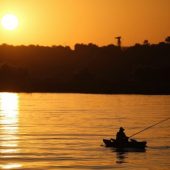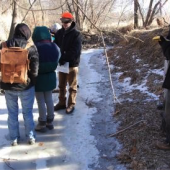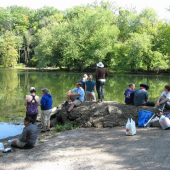
Abstract: This paper describes the outcomes of a game designed to teach advanced leadership skills, specifically influence and negotiation strategies, to current and aspiring sustainability professionals at Virginia Tech’s Center for Leadership in Global Sustainability. In the game, students assume the role of a key stakeholder and practice principle-based negotiation, conflict management, consensus building, and related influence skills needed by professionals working on complex sustainable development challenges such as the transboundary resource issues
regarding hydropower and watershed management. We collected pre- and post- survey data to assess the effectiveness of the simulation in developing students’ negotiation and influence skills. Results suggest that the training helps students develop confidence in using influence and negotiation skills and feel more competent and better prepared to serve as leaders in the field.

This case study describes a problem-based and service learning module in which undergraduate students participated in a community-based project. Students joined a group consisting of local non-governmental organizations (NGOs), public and private organizations, concerned citizens, and city officials to tackle issues concerning the local watershed. The case study took place over a number of years from 2014 to 2016 and will continue in subsequent academic years with a new group of multidisciplinary students.
Students put together documentation for a grant application that resulted in the city receiving $2.5 million dollars in grant money towards sustainable stormwater management systems. This aspect of the project included extensive data collection and analysis, much like the kind of work water conservationist in the field would perform. Students continued the work by using the data to plan and design appropriate, site-specific best management practices (BMPs) for the campus and in subsequent courses will implement these designs on site.
The mode of instruction described in this case study proved quite engaging to the students because it put them in the heart of an actual local project, doing work that was removed from a purely academic exercise – thereby offering a real-world scenario as field employees. The goal is to provide hands-on instruction that inspires and engages students and allows them to apply concepts of watershed management as a service to their local community.

Regional movements toward sustainability recognize that we share a common future. An approach to sustainability education infused with social justice requires joining this common endeavor alongside transformational approaches on individual, community, and larger scales. Transformation occurs most deeply through developing personal relationships with others working in these complex areas. Such relationships humanize abstract issues and build empathy, and they also help learners to better understand and describe ways in which they share similar motivations towards sustainability with others who initially seem quite different from themselves. This paper describes how a residential and experiential undergraduate semester in sustainability studies used personal encounters with a diversity of actors in our watershed to illustrate the range of people who must be considered and included in moving toward regional sustainability. Engaging a broad spectrum of people enables students to acknowledge the need to move forward alongside those who are different from and similar to themselves in various ways, redefining “them” as “us” within the watershed.
Continue Reading